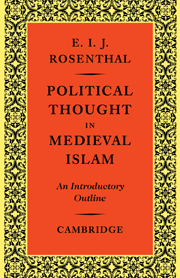Book contents
- Frontmatter
- Contents
- AUTHOR'S NOTE
- ABBREVIATIONS
- INTRODUCTION
- PART I CONSTITUTIONAL LAW AND MUSLIM HISTORY
- PART II THE PLATONIC LEGACY
- V POLITICAL PHILOSOPHY IN ISLAM
- VI AL FĀRĀBĪ: THE FOUNDATION
- VII IBN SĪNĀ: THE SYNTHESIS
- VIII IBN BĀJJA: INDIVIDUALIST DEVIATION
- IX IBN RUSHD: THE CONSUMMATION
- X AL-DAWWĀNĪ: APPLICATION AND INTEGRATION
- APPENDIX: SOME TURKISH VIEWS ON POLITICS
- NOTES
- GLOSSARY
- INDEX
VI - AL FĀRĀBĪ: THE FOUNDATION
Published online by Cambridge University Press: 07 May 2010
- Frontmatter
- Contents
- AUTHOR'S NOTE
- ABBREVIATIONS
- INTRODUCTION
- PART I CONSTITUTIONAL LAW AND MUSLIM HISTORY
- PART II THE PLATONIC LEGACY
- V POLITICAL PHILOSOPHY IN ISLAM
- VI AL FĀRĀBĪ: THE FOUNDATION
- VII IBN SĪNĀ: THE SYNTHESIS
- VIII IBN BĀJJA: INDIVIDUALIST DEVIATION
- IX IBN RUSHD: THE CONSUMMATION
- X AL-DAWWĀNĪ: APPLICATION AND INTEGRATION
- APPENDIX: SOME TURKISH VIEWS ON POLITICS
- NOTES
- GLOSSARY
- INDEX
Summary
It is clear from the last chapter how important it is to see political science in the context of philosophy as a whole; it becomes abundantly evident when we examine in greater detail the works of Abū Naṣr al-Fārābī, in particular those concerned with politics. Though preceded by Al-Kindī, as initiator of Islamic philosophy, Al-Fārābī is the first Muslim thinker to have left political writings, either in the form of commentaries or in treatises of his own, based upon Plato. That he was more than a pioneer can be deduced from the habit of later writers of calling him “the second teacher”, with Aristotle as the first. In fact, he profoundly influenced all subsequent Muslim philosophers, in particular Ibn Bājja and Ibn Rushd in Spain, and Ibn Sīnā in the East, where he himself lived. He showed the way to, and gave an authoritative beginning to, the integration of Greek-Hellenistic philosophy in all its branches with Islam. In this preliminary sketch of political thought in medieval Islam we are concerned only with his contribution to political philosophy.
Under Neoplatonic influence he wrote his Book of Agreement between the ideas of the two philosophers, the divine Plato and Aristotle. This treatise—as the title suggests—attempts to establish a harmony between the two Greek philosophers where their views are apparently at variance, but it also seeks to reconcile philosophy and revelation, a necessary pre-condition of the integration of philosophy with Islam.
- Type
- Chapter
- Information
- Political Thought in Medieval IslamAn Introductory Outline, pp. 122 - 142Publisher: Cambridge University PressPrint publication year: 1958

